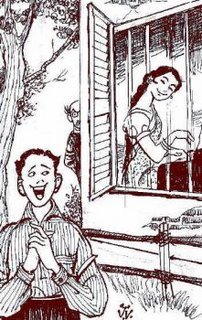MUSICAL MESSAGES

J. VASANTHAN munches how he relished music in his youth
I HAD an uncle who was very fond of music. He once bought a gramophone in Madras and brought it to his house in our town. It was a large, hand-wound instrument with a big megaphone type speaker, looking very much like the one featured in the `His Master's Voice' advertisement. My friends and I who were in elementary school at that time, would sit before this music box in the attitude of the little dog in the ads.
My uncle's collection of records, which had just one song per side, included `It's A Long Way to Tipperary' which set our feet tapping. This was our favourite song, and we made him play it often.
Let my people go
One day he played some records featuring Paul Robeson, and we were struck by the unusual voice. It was a deep, vibrating bass. We were told that on some occasions his voice was able to crack the glass in the windows of the auditorium where he sang.
My uncle told us about Robeson's deep and abiding consciousness of the plight of his ancestors who were African slaves sold to American plantation owners by slave traders. So when he sang `Go Down Moses,' he put a lot of feeling into it. This song was about Moses freeing the Israelis from Egyptian rulers. "Go down Moses/Tell the Pharaoh/Let my people go." But Robeson was singing about his forefathers.
Slaves were force-marched for miles and miles to reach the plantations. When they were allowed some rest, a boy with a jug came and poured some water for them to drink. When Robeson sang the song `Water Boy', it was a plaintive call for temporary succour after all the pain and exhaustion. It was difficult to control one's tears when Robeson called for the water boy.
Ol' Man River
Slave families were deliberately split, some being sold down the river Mississippi and others up the river. So, there was a lot of sadness, with no scope whatsoever for a reunion. Robeson gave voice to this despair in `O1' Man River'. The river keeps flowing along oblivious to the anguish it was causing. Other signers like Frank Sinatra attempted this song later. But none could match the intensity of Paul Robeson.
Later in his life, disillusioned by the discrimination against the Blacks in the U.S., Robeson refused to sing in America. He said India would be the only country he would like to sing in. But nobody here bothered to invite him. And so, that was that.
Daisy, Daisy
A well known headmaster in a southern town had several pretty daughters. The youngest, Daisy, was noted for her long and slender neck. During the 30's, there was a popular song titled `Daisy'. A young man next door, smitten by Daisy's charms, used to sing this song loudly, standing in full view of the headmaster's house. "Daisy, Daisy/Give me your answer, do/I'm so crazy/All for the love of you/I can't afford a carriage/For the day of our marriage/But you'll look so sweet/upon a seat/of a bicycle made for two." And Daisy, who was not indifferent to the young man, would sit at her piano near a window and play the same tune, like an accompaniment.
Sing No More
Unbeknownst to these love birds, (or should we say song birds?), the headmaster had been observing these goings-on. One day he summoned the young man to his house and asked, "Do you want to marry Daisy?" The flabbergasted young man was barely able to stammer his assent. "All right," said the old gent. "You can marry her. But don't sing hereafter."
The couple got married and made beautiful music together, taking care not to sing aloud. Their son grew up and fell in love with a girl called Masilla. He serenaded her with the song "Masilla unmai Kadhale", which was from an old MGR film. Their parents objected to the singing, but not to the match. They got married and are now a happy old couple. They had a son who grew up and ...well, perhaps that will be about enough of love songs.
Suffice it to say that music does have charms, wrong notes and all, to win the heart.
© Copyright 2000 - 2006 The Hindu

6 Comments:
//He said India would be the only country he would like to sing in. But nobody here bothered to invite him. And so, that was that.//
That was too sad to know, that we did not invite him over to India. Perhaps, do you think it was because of his race, India ignored him?
I enjoyed the rest...
Thank you, Orani. I think we ignored Paul Robeson because of our ignorance of such matters. JV
Thank you, Ms.Delphine. Your appreciation is like a tonic for a writer. Best wishes, JV
These days love-lorn Romeos don't sing but inflict radio listeners with their poems and problems. They are also given free counsel and encouragement by comperes who sound like effervescent collegians keen on having a good time at somebody's expense
Nice to know of such happy endings to love stories. I know of a few cases where love turned to hatred after marriage and even ended in divorce. Many men, I believe,look at love as conquests and think life is a pleasure trip. It is difficult to recover when such illusions are shattered.
I am glad to tell you, Anonymous, that the couples mentioned in the article lived happily everafter like in the fairy tale. JV
Post a Comment
<< Home